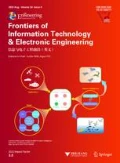Abstract
In this study, we investigate the leader-following consensus problem of a class of heterogeneous secondorder nonlinear multi-agent systems subject to disturbances. In particular, the nonlinear systems contain uncertainties that can be linearly parameterized. We propose a class of novel distributed control laws, which depends on the relative state of the system and thus can be implemented even when no communication among agents exists. By Barbalat’s lemma, we demonstrate that consensus of the second-order nonlinear multi-agent system can be achieved by the proposed distributed control law. The effectiveness of the main result is verified by its application to consensus control of a group of Van der Pol oscillators.
Similar content being viewed by others
References
Cheng L, Hou ZG, Tan M, et al., 2010. Neural-network-based adaptive leader-following control for multiagent systems with uncertainties. IEEE Trans Neur Netw, 21(8): 1351–1358. https://doi.org/10.1109/TNN.2010.2050601
Deng F, Guan S, Yue X, et al., 2017. Energy-based sound source localization with low power consumption in wireless sensor networks. IEEE Trans Ind Electron, 64(6): 4894–4902. https://doi.org/10.1109/TIE.2017.2652394
Godsil C, Royle G, 2001. Algebraic Graph Theory. Springer Berlin Heidelberg. https://doi.org/10.1007/978-1-4613-0163-9
Hu JP, Hong YG, 2007. Leader-following coordination of multi-agent systems with coupling time delays. Phys A, 374(2):853–863. https://doi.org/10.1016/j.physa.2006.08.015
Jadbabaie A, Lin J, Morse AS, 2003. Coordination of groups of mobile autonomous agents using nearest neighbor rules. IEEE Trans Autom Contr, 48(6):988–1001. https://doi.org/10.1109/TAC.2003.812781
Liu W, Huang J, 2016. Leader-following consensus for uncertain second-order nonlinear multi-agent systems. Contr Theory Technol, 14(4):279–286. https://doi.org/10.1007/s11768-016-6082-x
Lu MB, Liu L, 2017. Consensus of linear multi-agent systems subject to communication delays and switching networks. Int J Rob Nonl Contr, 27(9):1379–1396. https://doi.org/10.1002/rnc.3750
Lu MB, Liu L, 2018. Robust consensus of a class of heterogeneous nonlinear uncertain multi-agent systems subject to communication constraints. Chinese Control and Decision Conf, p.74–81. https://doi.org/10.1109/CCDC.2018.8407109
Meng ZY, Lin ZL, Ren W, 2013. Robust cooperative tracking for multiple non-identical second-order nonlinear systems. Automatica, 49(8):2363–2372. https://doi.org/10.1016/j.automatica.2013.04.040
Moreau L, 2004. Stability of continuous-time distributed consensus algorithms. Proc 43rd IEEE Conf on Decision and Control, p.3998–4003. https://doi.org/10.1109/CDC.2004.1429377
Olfati-Saber R, 2006. Flocking for multi-agent dynamic systems: algorithms and theory. IEEE Trans Autom Contr, 51(3):401–420. https://doi.org/10.1109/TAC.2005.864190
Olfati-Saber R, Murray RM, 2004. Consensus problems in networks of agents with switching topology and timedelays. IEEE Trans Autom Contr, 49(9):1520–1533. https://doi.org/10.1109/TAC.2004.834113
Ren W, Beard RW, 2005. Consensus seeking in multiagent systems under dynamically changing interaction topologies. IEEE Trans Autom Contr, 50(5):655–661. https://doi.org/10.1109/TAC.2005.846556
Slotine JJE, Li WP, 1991. Applied Nonlinear Control. Prentice-Hall.
Song Q, Cao JD, Yu WW, 2010. Second-order leaderfollowing consensus of nonlinear multi-agent systems via pinning control. Syst Contr Lett, 59(9):553–562. https://doi.org/10.1016/j.sysconle.2010.06.016
Su YF, 2015. Cooperative global output regulation of secondorder nonlinear multi-agent systems with unknown control direction. IEEE Trans Autom Contr, 60(12):3275–3280. https://doi.org/10.1109/TAC.2015.2426273
Su YF, Huang J, 2012. Cooperative output regulation of linear multi-agent systems. IEEE Trans Autom Contr, 57(4):1062–1066. https://doi.org/10.1109/TAC.2011.2169618
Su YF, Huang J, 2013. Cooperative global output regulation of heterogeneous second-order nonlinear uncertain multi-agent systems. Automatica, 49(11):3345–3350. https://doi.org/10.1016/j.automatica.2013.08.001
Tuna SE, 2008. LQR-based coupling gain for synchronization of linear systems. https://arxiv.org/abs/0801.3390
Wang CR, Ji HB, 2015. Robust consensus tracking for a class of heterogeneous second-order nonlinear multiagent systems. Int J Rob Nonl Contr, 25(17):3367–3383. https://doi.org/10.1002/rnc.3269
Wieland P, Sepulchre R, Allgöwer F, 2011. An internal model principle is necessary and sufficient for linear output synchronization. Automatica, 47(5):1068–1074. https://doi.org/10.1016/j.automatica.2011.01.081
Author information
Authors and Affiliations
Corresponding author
Additional information
Project supported by the National Natural Science Foundation of China (No. 61773327), the Research Grants Council of the Hong Kong Special Administrative Region of China under Project CityU/11274916, and Projects of Major International (Regional) Joint Research Program of the National Natural Science Foundation of China (No. 61720106011)
Rights and permissions
About this article
Cite this article
Lu, MB., Liu, L. Leader-following consensus of second-order nonlinear multi-agent systems subject to disturbances. Frontiers Inf Technol Electronic Eng 20, 88–94 (2019). https://doi.org/10.1631/FITEE.1800611
Received:
Accepted:
Published:
Issue Date:
DOI: https://doi.org/10.1631/FITEE.1800611




